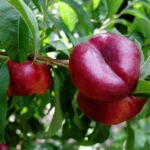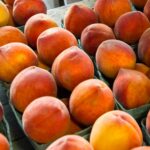U.S. competition and new regulations to put pressure on Aussie stonefruit
With the Australian Pesticides and Veterinary Medicines Authority (APVMA) looking to ban the use of insecticides dimethoate and fenthion, the country's stonefruit growers are seeking alternatives to treat fruit fly. At the same time a protocol is in its final stages to allow imports of the fruit from the U.S., which would clash with several growing regions. At www.freshfruitportal.com we speak with Low Chill Australia Inc president Raymond Hick, who questions the Federal Government's imbalanced approach to what free trade should entail - a level playing field. 
The APVMA is currently in the review process with the two chemicals due to health and environmental concerns, but the consequences for growers could be severe if a ban is announced without enough transition time to find a new alternative.
"If we lose these chemicals I will finish farming stonefruit, bring a dozer in and bulldoze the trees because there’s no way I would sit here producing fruit with the thought that one piece of fruit might get into the market that has live maggots in it and someone buys it," Hick tells www.freshfruitportal.com from his farm in Bangalow, near Byron Bay in New South Wales.
"I’m putting a third of my orchard at risk this year on the basis I’m testing alternatives to the traditional chemicals. I’m giving it my best shot to find an alternative but I personally think it’s going to be very difficult to control fruit fly without a systemic chemical, and cover spray chemicals I don’t think are going to be effective.
"I'm not saying that we couldn't - with the right amount of research - do it better. We could probably do it with less chemicals and have a longer withholding period, but if we were in Europe and the government were going to do this, they would then say 'we’re going to give you time to find an alternative' and our government doesn’t do that."
He says the Australian government "doesn't particularly worry about agriculture", with third parties making decisions for the industry often without having visited a farm or consulted growers.
"Australian politicians seem to be quite happy that they are going to leave for the next generation the fact we’ll be dependent on other countries to supply our food – this seems to be the accepted format.
"The food that comes in from overseas is not under the same rigorous controls that we’ve got. They don’t even test them for residues, so they can be spraying DDT on the product and we’ll still import them.
"In the old days we used to have quarantine officers that would test for this but as each year unfolds we get less and less people on the frontline and more people in the public service are going into the backroom auditing functions."
He says the removal of these key products will spell rationalization for the stonefruit industry and put jobs at risk for the tens of thousands of people it employs.
"If they remove those I think we won’t need to worry about U.S. imports, because most of the farmers will just go out of the industry, certainly the low chill ones of Queensland, New South Wales and parts of Western Australia.
"It just makes it very difficult because with stonefruit you’ve got a lead time of three years. I really should be rotating a third of my trees now into newer varieties, but none of us are doing that at this stage, because we are just not certain there is going to be a future, and why pour good money after bad?"
Increased competition from across the Pacific
While Australian growers are concerned about new ways to treat fruit fly, the consensus is that the country will likely reach a protocol with the U.S. very soon to treat a pest in that country - Spotted Wing Drosphila.
"The only issue that we’re going to have is when the American fruit comes in, it will come in at the start of our season and be virtually in for most of our season, which is in the low chill areas.
"Under the free trade agreement with the United States, agriculture and stonefruit is one of the issues and they’re going to open up our market to the Americans.
"We haven’t had them before because we’ve always been of the opinion they have some pests over there that would be detrimental to our crops if they arrived in our country with the fruit, and we’ve been making sure that everyone’s happy with their ability to contain those pests."
He says there are varying opinions as to whether U.S. stonefruit will enter the market this year or in 2012.
"Sometimes these things can happen quicker than you think, and at other times they seem to drag their feet. You never quite know with the bureaucracy."
Hick says his personal opinion is that free trade has to be done on the same basis, but the U.S. subsidizes its farmers heavily.
"We have no subsidies here at all so to me it’s not a level playing field. Over there they put out yield insurance so if you don’t achieve your yield, through hurricanes, frost, drought, locusts or whatever it may be, you can claim on a very highly subsidized federal government insurance package."
Higher labor costs also add to Australia's difficult competitive situation with its North American trade partner.
"Our biggest problem is that their labor rate is US$8 an hour and ours is AUD$22 (US$22.80). I don’t care how efficient we are, we cannot compete with countries that have got a labor rate a third of ours.
"But the Australian authorities say 'it's not our problem, it's your problem, you have to solve it'. As an industry we are self-funded and are putting every cent we have into trying to find an alternative, and we’re putting half a million dollars of our levy payers’ funds into them and that’s it, that’s all we have.
"I would have thought that any thinking government would have seen that we are trying our utmost to find alternatives, and they would support us in this."












































